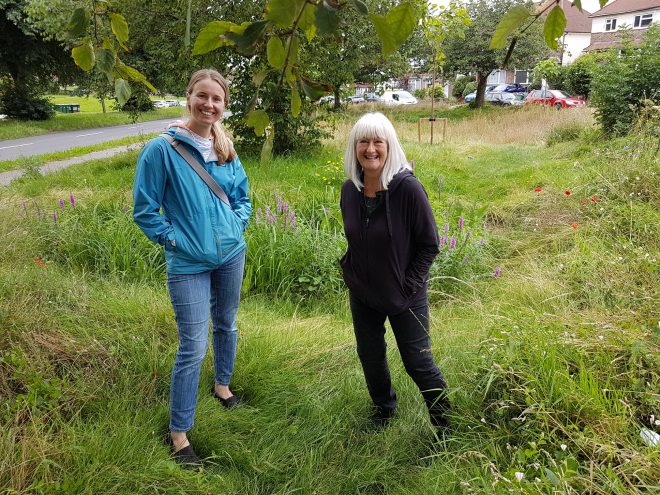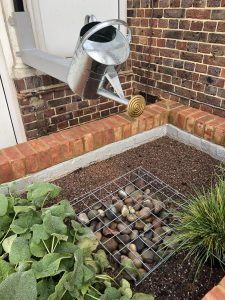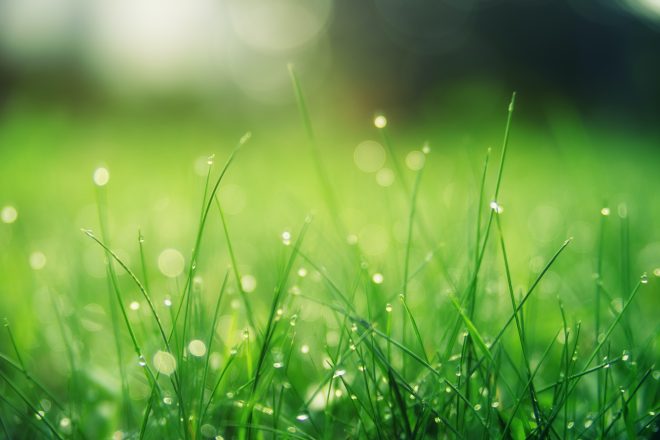Major programme launched to create green network of rain gardens across Brighton and Lewes
March 22, 2022

Hundreds of rain gardens to help protect the South Downs aquifer around Brighton and encourage wildlife are set to be created as part of an inspiring new initiative.
The theme for World Water Day on 22 March is groundwater and The Aquifer Partnership (TAP) is launching a major campaign to create as many rain gardens as possible across the Brighton, Hove and Lewes area by 2025.
The campaign, with the motto “Slow it down, soak it up”, is calling on communities, residents, schools and businesses to help create simple, inexpensive rain gardens that deliver many benefits for the environment. Online and in-person training workshops are also being offered over the next three years to build local expertise in rain garden techniques.
A rain garden is a DIY-friendly way to manage rainwater run-off and create a welcoming space for wildlife. The area, either dug into a garden or using a planter, uses specially-selected grasses and plants to slow and purify water run-off from hard surfaces and allow it to soak into the ground naturally.
 TAP was established in 2016 to develop projects and solutions to protect the groundwater of the chalk aquifer, which supplies drinking water to the population of Brighton, Hove and Lewes. Climate change and extreme storm events, combined with more impermeable surfaces from development, mean that the aquifer is under increasing threat from pollution, including run-off from roads and vehicles and chemicals used on crops and other open spaces.
TAP was established in 2016 to develop projects and solutions to protect the groundwater of the chalk aquifer, which supplies drinking water to the population of Brighton, Hove and Lewes. Climate change and extreme storm events, combined with more impermeable surfaces from development, mean that the aquifer is under increasing threat from pollution, including run-off from roads and vehicles and chemicals used on crops and other open spaces.
Susie Howells, Partnership Development Manager for TAP, explained: “Rain gardens are one part of the solution. They use plant power to slow down and cleanse water, which helps to replenish the aquifer beneath our feet naturally.
“Climate change is a reality. We’re having hotter, drier summers, warmer, wetter winters and more frequent and intense storm events. At the same time more land is developed, putting increasing pressure on drainage systems and, ultimately, on the aquifer. So we have to take good care of our natural resources, including the drinking water that has supplied the south coast for hundreds of years.
“Our target is to have as many rain gardens as possible in the Brighton, Hove and Lewes area by March 2025. We’re keen to build up a green network of rain gardens and inspire people of all ages to help raise awareness of the importance of groundwater and care for our precious aquifer.”
 And Susie added: “We’re looking for people who are good at DIY and gardening to work with us in promoting the campaign, and joining in or delivering workshops, as well as businesses who have expertise in permeable paving and rain gardens. It could be anything from helping to spread the word through your networks to delivering training, sharing your experience with a case study and anything in between!”
And Susie added: “We’re looking for people who are good at DIY and gardening to work with us in promoting the campaign, and joining in or delivering workshops, as well as businesses who have expertise in permeable paving and rain gardens. It could be anything from helping to spread the word through your networks to delivering training, sharing your experience with a case study and anything in between!”
Five spaces are available for the first two-day rain garden training workshop in Brighton in early April. People can register their interest at TAP@southdowns.gov.uk
For more information about creating a rain garden, visit the TAP website at https://wearetap.org.uk
To find out more you can email Susie at TAP@southdowns.gov.uk
Picture: Susie Howells, Partnership Development Manager for TAP, (right) alongside Aimee Felus, TAP Programme Delivery Manager, at the rain garden in Carden Avenue, Brighton.
What are the benefits of rain gardens?
Rain gardens have many environmental benefits including:
- Slow down surface water run-off, preventing the drainage system being overwhelmed
- Increase biodiversity by attracting wildlife
- Create an attractive space with the opportunity to plant a wide range of perennial plants
- Can absorb 30 per cent more rainwater than a lawn
- Promote soil health and help prevent soil erosion

